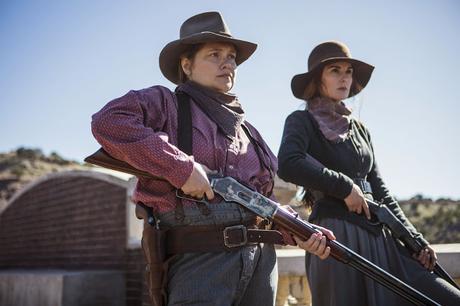
There aren’t too many illusions still intact about the romance of the frontier in 2017. It has been made abundantly clear that there is a stark difference between the idealistic language of the Constitution and the fiery speeches about setting an example for the world, and the actual bloody and violent way in which the United States carved themselves into existence. Before Godless, the much missed Deadwood, which has been in talks to return and perhaps couldn’t find a better time than now to do so, has portrayed how much of the founding myth was actually a tool of violence against women and minorities, what the outcome is when a land is founded on lawlessness, guns and capitalism.
Godless isn’t a feminist western in the way that its promotion would have suggested. The town of La Belle in New Mexico has lost almost all of its adult men in a mining accident, only leaving a sheriff behind who is losing his sight and a surviving miner who has lost his mind, but the consequence of this event – women running the town themselves, and doing fairly well at it, particularly Mary Agnes (Merritt Wever), widow of the previous mayor – is only in the background of the story. Instead, Godless is feminist insofar as it applies feminist theories to its deconstruction of masculinity, investigating the damage that the frontier ideal of manliness does to the actual men of this rugged land. Godless isn’t a story about women, but one about what happens when the men are absent or physically and mentally damaged.
That absence takes the form of the mining disaster, which wiped out a whole town and left it without an economic base, struggling to find its footing – in this post-men world, a former sex worker is suddenly the wealthiest person in town, and is running a school out of her former workplace. The mayor’s widow now wears his clothes and his responsibilities, both of them proudly. While her brother Bill (Scoot McNairy, once again impossible not to like after his swansong on Halt and Catch Fire), the sheriff, is ridiculed for his cowardice, she is well-respected, and even gets away with transgressing other taboos. This potential freedom is soon threatened when Mary Agnes’ attempt to ensure the continued independence of the town – by reopening the mines with money provided by a bank – is swiftly turned into a backlash in which the women lose all of their independence, or give it away willingly because nothing in their lives has prepared them for the idea of running their own lives. She frustrated looks on while her fellow townswomen give away their autonomy willingly, in exchange for the (soon to be revealed – fake) security of men. It’s a profoundly personal betrayal, because she knows that the only way for her to exist the way she has now found she enjoys existing is to be in a town where all those powers that would force her back into a corset are absent.
Her mirror image, yet rival, is Michelle Dockery’s Alice, who came to the town as a stranger, taking a Native American as a second husband but soon losing him to racist violence (another absent man), who is now raising her son along with her late husband’s mother on a remote farm. With little contact to La Belle, she seems unwilling to connect to anyone, and wishes herself back to the city, where she can’t go anymore because she lacks the resources. She is trapped in a life she does not want as well, but soon her decision to take in a stray (after shooting him) connects her inseparably to the town she so despises. Her act of kindness to a stranger who at first cannot speak, and later reveals that he cannot read, dooms the town, as Roy Goode (Jack O’Connell) escaped a roving band of gangsters, and more specifically, Frank Griffin (Jeff Daniels), an odd and violent figure with a hard-to-read yet strict code of honor. Frank considers Roy a son, and his decision to run away after shooting his father figure and costing him an arm – another physically damaged man, who carries his lost arm with him like a relic constitutes a betrayal that can only be repaid in blood. So he hunts his wayward son, threatening to kill anyone who harbours or helps him, which now includes Alice, and La Belle itself.
The ways in which all of these fates entwine unfolds elegantly on screen, and all of the actors are charismatic, and inhabit their characters perfectly. There is much to be said about the richness of the smaller characters here, in particular Alice’s son, played by Tantoo Cardinal – who was raised by women alone, and seems gently at odds with anything that the world may expect of him, and takes to Roy as a father figure of sorts. Roy himself is at odds as well, especially once Iyovi and Mary Agnes realize his talent in breaking horses – he is gentle, kind, more at home with the horses than with any human, and later he reveals how he ever came to run with Frank Griffin’s gang. There is a subtle point here about the proliferation of violence through men who seem so ill-suited to it, the inevitability of a place that breeds violence so readily corrupting everyone (it is all the more effective when Frank’s incredible violence is contrasted with his moments of humanity, when he helps people, or guides them). This isn’t the almost comical, over-the-top violence meant to shock viewers – it is one deeply connected to the place that is portrayed here, one that seems entirely interwoven in the fabric of the communities that inhabit this impossible and ungoverned land.
The impotence of the law is personified in Mary Agnes’ brother, and in his tragic-comic path here. He is ridiculed by the town that considers him an incompetent coward, but the story later reveals that he is in fact going blind, and believes himself to be dying – until a traveling salesman offers him a pair of glasses, which solve his predicament. It still leaves his deep grief for the loss of his wife behind, that goes so deep that he can’t bring himself to be a proper father to his two children, especially his young daughter, whose birth he associates with the death of his beloved wife. He is an unusual figure for a Western, a man with all the emotional weight of Timothy Olyphant’s Seth Bullock, but none of his ability. Instead he constantly finds himself upstaged by Whitey Winn (Thomas Brodie-Sangster, with another outstanding performance), a gun-slinging teenager with a very soft heart. One of the hardest punches that Godless delivers is the amount of hope that the town puts into this kid, and the speediness with which that hope is destroyed before the inevitable showdown even happens. The little side-story of his deep love for Louise (the amazing Jessica Sula, who deserved so much better from Skins and will hopefully appear in many more things after this), who lives in the neighbouring all-black town which regards anything happening in La Belle with the deep suspicion of weathered Civil War veterans, shows how good Godless is at fleshing out even the most minor characters, showcasing Louise’s strength and resilience after an unbelievable loss.
In conclusion – I think that Godless is more successful for its small moments rather than the greater arc that so inevitably bends towards the bloody showdown. It will remain memorable for its attention to detail, the way it creates so much emotional resonance with so little. There’s Roy, managing to bend a horse to his will not with violence but by comprehending its nature completely. There’s Iyovi’s deep grief and regret when one of the beautiful creatures breaks its legs due to his own recklessness, and the cost of having to bear the consequences. There’s the completely outstanding Merritt Wever, bringing everything in every single scene she is in, raging against the loneliness of wanting more than what the world is prepared to give her willingly. There is, deeply in the fabric of this show, an argument against the self-replicating violence at the heart of the United States.
2017, created by Scott Frank, starring Jack O'Connell, Jeff Daniels, Merritt Wever, Michelle Dockery, Scoot McNairy, Thomas Brodie-Sangster, Tantoo Cardinal, Samantha Soule, Kayli Carter, Audrey Moore, Tess Frazer, Jessica Sula.

